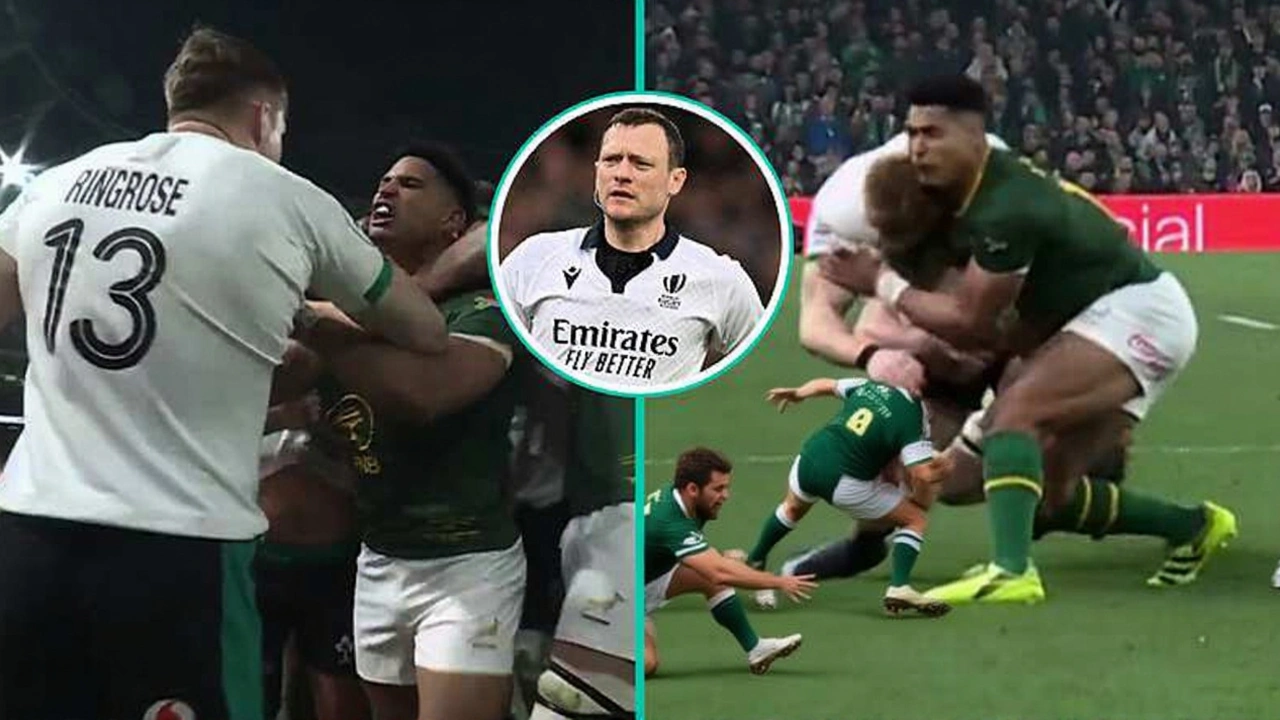The South Africa national rugby union team — the Springboks — finally conquered the Aviva Stadium curse on Saturday, November 16, 2024, grinding out a scrappy 24-13 victory over Ireland in front of a stunned, silent crowd. It was their first win in Dublin since November 10, 2012 — a 13-year, 4,389-day drought broken not with flair, but with grit, discipline, and Ireland’s own unraveling. The match, part of the November 2024 international rugby window, ended with Aviva Stadium echoing not with cheers, but with disbelief. And the reason? Five yellow cards. One red. And a team pushed to the edge by their own mistakes.
When Ireland Lost Control
It wasn’t just that Ireland lost. It was how they lost. In the 25th minute, lock James Ryan, 28, received a yellow card for a dangerous clear-out. But the referee Matthew Carley — a veteran of the Rugby Football Union — reviewed it, upgraded it to a red, and sent him off for 20 minutes. That was just the start. Within 15 minutes, fly-half Sam Prendergast, 21, fullback Jack Crowley, 23, props Andrew Porter, 28, and Paddy McCarthy, 26, all saw yellow. Ireland played with 13 men for nearly 10 minutes, then dropped to 12 after Ryan’s return. At one point, they had fewer players on the field than the Springboks had substitutes on the bench.Springboks Seized the Moment
The Springboks didn’t waste a single second. Fullback Damian Willemse, 26, opened the scoring in the 5th minute with a well-timed finish off a delayed pass from veteran center Damian de Allende, 33. Then, in the 28th minute, scrumhalf Cobus Reinach, 34, bulldozed over from a dominant scrum — Ireland down to 13 men — for his 19th Test try. The real dagger came in the 39th minute: a penalty try awarded after Ireland’s scrum collapsed three times in a row under pressure. By halftime, it was 19-7. Ireland’s lone try came from hooker Dan Sheehan, 27, but Prendergast’s conversion was the only bright spot in a darkening afternoon.Then, in the 55th minute, young fly-half Sacha Feinberg-Mngomezulu, 23, powered through from another scrum, sealing the win. His touchline conversion missed, but it didn’t matter. The damage was done. The Springboks’ scrum, described by Good Things Guy as "simply refusing to move backwards," became the match’s defining feature. While Ireland’s forward pack broke down under pressure, South Africa’s engine room kept churning.
The Brawl That Wasn’t Punished
The match wasn’t just about discipline — it was about what wasn’t called. In the 15th minute, Feinberg-Mngomezulu launched a high tackle on Ireland center Tommy O’Brien, 24. The impact sparked a mass brawl, with players from both sides converging. Cameras caught Matthew Carley watching the chaos, arms crossed. No card. No review. No penalty. Ireland fans erupted in protest. The Springboks’ coaching staff, led by Rassie Erasmus, 52, stayed calm. "What a win!" he told reporters afterward. For them, it was a victory earned. For Ireland, it felt like justice had been delayed.History, Reversed
This wasn’t just a win. It was a reckoning. The Springboks had lost in Dublin in 2014, 2017, and 2022. Each defeat stung. Each time, Ireland’s home advantage felt untouchable. Now, under Andy Farrell, 49, Ireland had only been beaten twice in Dublin: once by New Zealand in 2018, and now, by South Africa. The Irish Rugby Football Union faces potential disciplinary hearings within 72 hours. World Rugby statistics confirm this was the most cards ever issued to a team in a single Test match during the professional era.Meanwhile, the Springboks extended their head-to-head record against Ireland to 32 wins in 45 Tests. But this? This was the one that mattered most. Not because of the points. Not because of the stats. But because they finally walked out of Dublin with their heads up — and Ireland’s, hanging low.

What’s Next?
South Africa’s next challenge? A home Test against Argentina in December. But the narrative has shifted. They’re no longer just a physical team. They’re a mentally tough one. Erasmus has them believing they can win anywhere. Ireland, meanwhile, must answer tough questions. Was this a one-off meltdown? Or a systemic flaw in their discipline? The upcoming Six Nations will be a test of character.Behind the Cards: A New Era of Discipline?
World Rugby has been pushing for stricter enforcement of high tackles and scrum integrity. This match may be the turning point. Five cards in one game? That’s not bad luck. That’s a failure of preparation. Ireland’s forwards were outmuscled. Their scrum-half was rushed. Their fly-half missed a post. And their leadership cracked under pressure. Meanwhile, South Africa’s coaching staff — including assistant coach John Dobson — had clearly drilled their players to exploit chaos. They didn’t panic when Ireland went down to 12. They doubled down.For fans, it was brutal. For analysts, it was brilliant. And for the Springboks? It was redemption.
Frequently Asked Questions
How did the Springboks manage to win despite Ireland’s early try?
Ireland’s early try by Dan Sheehan was offset by the Springboks’ relentless scrum dominance and Ireland’s mounting disciplinary issues. South Africa scored three more tries — including a penalty try — while Ireland’s players were in the sin bin. The Springboks capitalized on every opportunity, turning Ireland’s chaos into points. Their defense held firm even when outnumbered, and their set pieces were flawless under pressure.
Why was James Ryan’s yellow card upgraded to a red?
Referee Matthew Carley initially showed Ryan a yellow for a dangerous clear-out, but after reviewing footage with the TMO, he determined the tackle met the high tackle threshold for a red card under World Rugby’s 2024 safety protocols. The tackle made direct contact with the head of the opponent without sufficient control, and the severity of the impact warranted the upgrade — a decision that shifted the game’s momentum.
What impact does this win have on South Africa’s World Cup chances?
This victory proves the Springboks can win away from home against top-tier teams under extreme pressure — a key trait for World Cup contenders. Their ability to control set pieces, absorb chaos, and stay composed while outnumbered signals mental resilience. With their scrum and defense firing, they’re now considered serious threats in the 2027 tournament, especially in away conditions.
Why wasn’t Sacha Feinberg-Mngomezulu carded for the high tackle?
Despite sparking a brawl, Feinberg-Mngomezulu’s tackle on Tommy O’Brien wasn’t deemed a direct head contact by the referee team. The ball was in play, and the contact appeared to be more shoulder-to-head than direct, which falls into a gray area under current guidelines. The lack of a card drew criticism but didn’t violate the letter of the law — though it may prompt a review by World Rugby’s disciplinary committee.
Is this Ireland’s worst performance under Andy Farrell?
By disciplinary standards, yes. Five cards in one match is unprecedented under Farrell. While Ireland lost to New Zealand in 2018 by a narrower margin, this loss was defined by self-destruction — poor ruck discipline, scrum failures, and unforced errors. Farrell’s team has been known for structure; this was a collapse of fundamentals. Fans are now questioning whether their game plan is too rigid under pressure.
What does this mean for future Springboks-Ireland matchups?
The psychological edge has shifted. Ireland can no longer count on home-field advantage against South Africa. The Springboks now know they can win in Dublin — and Ireland knows they can be broken by discipline. Future matches will likely be more physical, with both teams preparing for high-pressure set pieces. The 2025 Autumn Nations Series could see a rematch, and this time, Ireland will be hunting redemption.

Write a comment